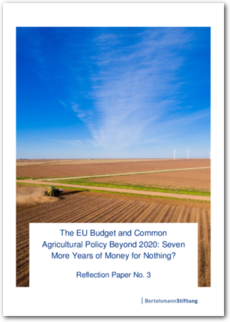Reflection Paper No. 3: Preparing for the Multiannual Financial Framework after 2020
Bertelsmann Stiftung (Hrsg.)
Prof. Dr. Friedrich Heinemann, Stefani Weiss
The EU Budget and Common Agricultural Policy Beyond 2020: Seven More Years of Money for Nothing?
- Ausgabeart
- Erscheinungstermin
- 06.09.2018
- DOI
- 10.11586/2018052
- Umfang/Format
- 18 Seiten, PDF
Format
-
PDF
Preis
kostenlos
Beschreibung
The Common Agricultural Policy (CAP) accounts for roughly 38 percent of EU spending, the largest single expenditure in the Multiannual Financial Framework (MFF). According to the new Commission proposal for the MFF 2021–2027, this will change only slightly. Direct payments to farmers will still constitute the largest item in the CAP budget.
This analysis looks into the two main arguments for legitimizing CAP: income protection and European public goods. Our proposal for reform starts from the premise that income protection cannot justify the current level of direct payment from the EU budget. Likewise, the public good justification has not come to fruition. Evidence indicates that “greening conditions”, set up to protect the environment, have been largely non-binding, unproductive, and thus an unjustifiable expense. We conclude that the current proposal is not in line with a sound public goods approach. Without substantial modification, direct payments will remain an ineffective incentive for the provision of agricultural services in the fields of environment, climate policy, and animal protection. In coming months, there are still opportunities to improve the draft. We recommend that in the future budget a certain share of direct payments – up to 50 percent of national envelopes – is spent on eco-schemes that should reflect a strict “value-for-money” rationale. Eco-schemes would then define compensation for the verified provision of public goods at well-defined unit prices.




